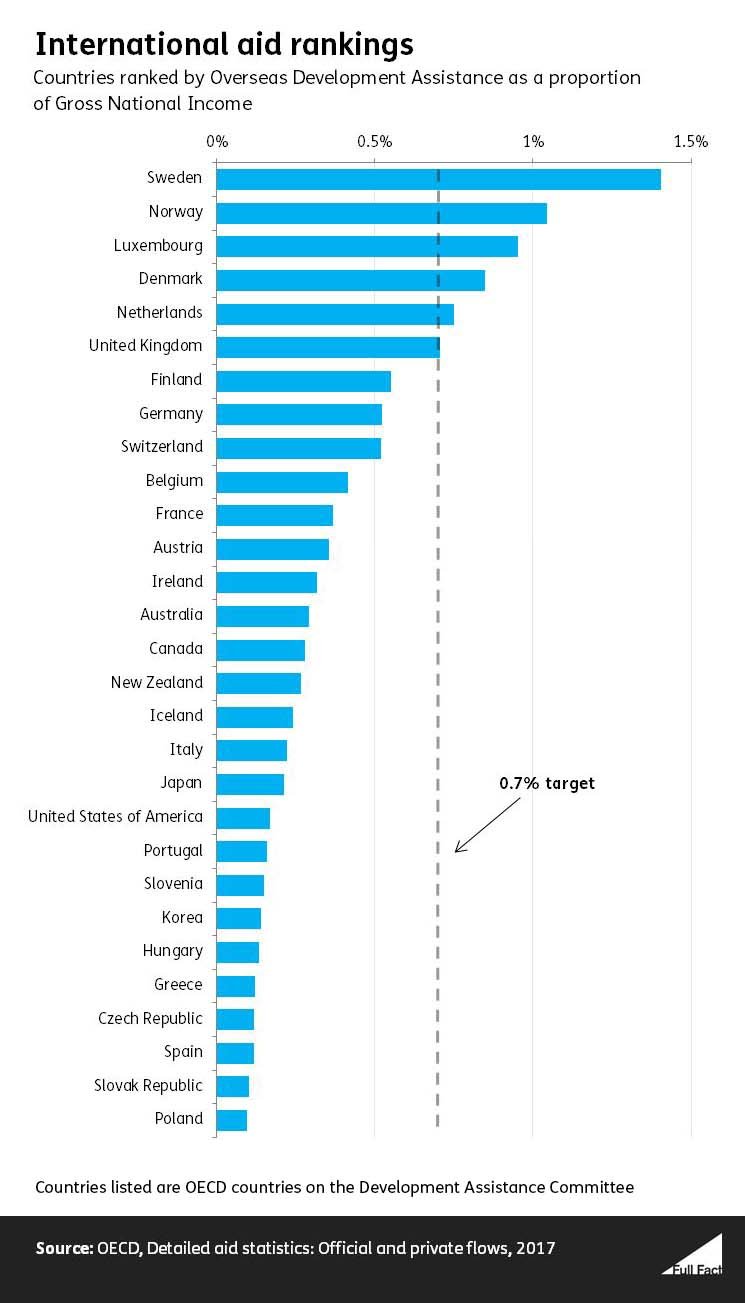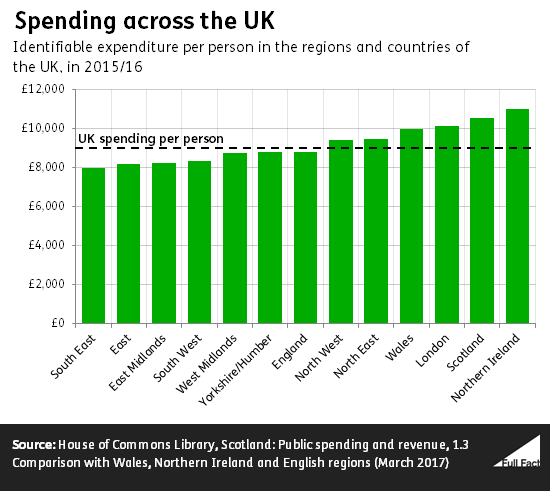UKIP manifesto launch, factchecked
We've factchecked five claims from the UKIP manifesto launch.
Join 72,953 people who trust us to check the facts
Sign up to get weekly updates on politics, immigration, health and more.
Subscribe to weekly email newsletters from Full Fact for updates on politics, immigration, health and more. Our fact checks are free to read but not to produce, so you will also get occasional emails about fundraising and other ways you can help. You can unsubscribe at any time. For more information about how we use your data see our Privacy Policy.
“The EU will also have to plug a huge financial hole of some 12 per cent of the gross EU budget when Britain leaves.”
- While there are different ways of calculating a country’s share of the complex EU budget, 12% is commonly cited as the UK’s share, taking into account our rebate (discount). In 2016 it was 13%, according to the Treasury, and some argue for 15%.
- As the UK pays in more than it gets back in EU spending, and is the second largest net contributor after Germany, Brexit will blow a hole in the EU finances.
- Both the EU and the UK seem to think that the UK will owe the EU some money when it leaves as part of the transition, for things that the UK signed up to when we were a member, but there’s no official figure and a big debate over how much this ‘divorce bill’ might be.
“[Spending 0.2% of GNI] will bring Britain’s aid spending into line with that of other advanced nations, such as the USA. We will still be spending around £4 billion annually, which is more in cash terms than Spain and Italy combined.”
- The government is currently meeting a UN target to spend 0.7% of the UK’s Gross National Income (GNI) on overseas aid each year. GNI is the UK’s output of goods and services, plus any income we get from abroad.
- So for every £100 that’s made in the UK, 70p goes toward foreign aid.
- The amount this translates to in cash varies depending on the size of the economy. We spent £13.3 billion in 2016. If we had spent 0.2% of GNI in 2016, it would have worked out to about £3.8 billion.
- Our economy is forecast to grow - if it does, the amount spent at the 0.7% target will increase. The same applies if the target is reduced to 0.2%.
- The UK was one of six countries meeting the UN’s 0.7% target in 2016. The USA was one of ten members of the OECD’s Development Assistance Committee (DAC) spending 0.2% or less, putting it in the bottom third. The average for the DAC is about 0.3%.
- Spain and Italy spent almost $9 billion between them in 2016, which is about £6.5 billion at the average exchange rate for that year. We’ve asked UKIP what it was referring to.

“Spending £75 billion just to save a few minutes between London and Leeds is ludicrous and, we think, unethical.”
- We’ve asked UKIP for a source on this.
- The official estimate of the cost of HS2 is between £41 billion and £56 billion (in 2015 prices).
- However, the National Audit Office has said that “the £55.7 billion funding package does not cover funding for all the activity needed to deliver the promised growth and regeneration benefits”. The Public Accounts committee of MPs has also expressed concerns about how realistic these cost estimates are.
- In 2013, Bill Cash MP said in the House of Commons that “the amount has already gone up to £50 billion-plus, and I will not be surprised if it is £75 billion by the time this is finished”. In 2016 High Speed UK—a campaign group seeking an alternative to HS2—said in a press release that HS2 “could end up costing over £75 billion.” Neither referenced any specific source for the £75 billion figure.
"Treating those ineligible for care costs British taxpayers around £2 billion every year…[UKIP will launch the toughest ever crackdown on ineligible foreign nationals using our NHS]”
- It has been estimated that around £100 to £300 million a year is spent on deliberate health tourists and patients visiting England and “taking advantage” of the NHS. Those are incredibly rough figures.
- Another £1.8 billion a year is estimated to be spent on people who happen to end up needing medical treatment when they are here. This includes things like treating people who are here on holiday and have broken a leg, or an expat who has come back to England to see a trusted doctor.
- There are certain services which the NHS can’t charge for at the moment, even if you don’t normally live in the UK. This includes emergency treatment or going to visit a GP. So even if the NHS charged for all the services it possibly could and received all that money, it wouldn’t cover the full amount foreign use of the NHS is estimated to cost.
- Looking at the services that can be charged for, the government is aiming for about £500 million a year to be recovered by 2017/18. £200 million of that will come from the “healthcare surcharge” paid by immigrants coming here.
- But it predicts it won’t meet that, and will charge about £346 million in 2017/18. This is only the amount charged, we don’t know how much of this it will actually receive.
- Government spending on health in England was £115 billion last year.
“Replace the out-dated Barnett Formula with a fair funding formula based on need”
- Most of the spending by the devolved governments in Scotland, Wales and Northern Ireland is funded by grants from the UK government. The amount they get is largely worked out by the ‘Barnett formula’.
- When the UK government changes the funding for a service in England, the Barnett formula tries to achieve a similar change in funding per person in the devolved administrations. So population is the only ‘need’ that is taken into account.
- There have been many calls for a change in the Barnett formula.
- Some—such as the Calman Commission in Scotland—have criticised the formula for not funding the UK countries according to their needs. Others are unhappy with current differences in public spending per head across the UK countries, which are partly the result of using the formula over the years.
- Funds within England tend to be allocated based on indicators of need, such as demographic characteristics, deprivation and cost. The Holtham Commission found that Wales would receive more money if UK funds were allocated to Wales in the same way that English funds are allocated within England.
